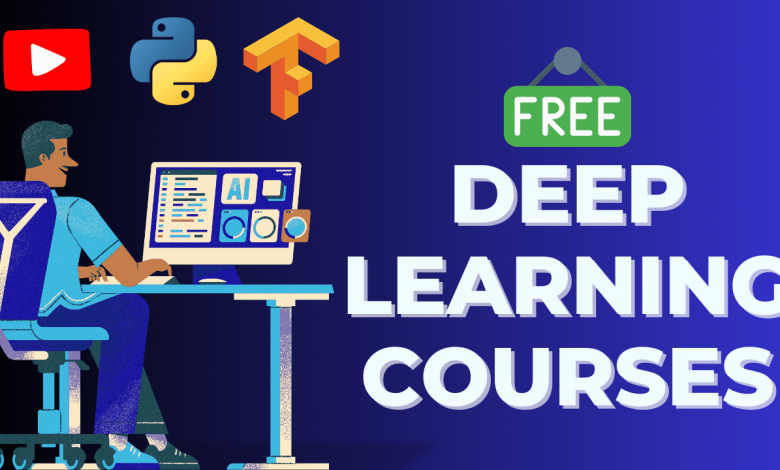5 Free Courses to Master Deep Learning in 2024

5 Free Courses to Master Deep Learning in 2024
Image by Author
AI applications are everywhere.
I use ChatGPT on a daily basis — to help me with work tasks, and planning, and even as an accountability partner. Generative AI hasn’t just transformed the way we work. It helps businesses streamline operations, cut costs, and improve efficiency.
As companies rush to implement generative AI solutions, there has been an unprecedented surge in the demand for AI skills. There hasn’t been a better time to learn AI.
According to Forbes, there is a shortage of qualified employees in the realm of AI. This means that AI skills will fast-track your career, helping you land new jobs and outdo the competition.
Deep learning is a core AI skill. Since generative AI models are built on deep learning architectures, knowledge of deep learning will make you invaluable to employers seeking AI talent.
Learning the workings behind generative AI models will open countless opportunities for you in fields like:
- Prompt engineering
- AI engineering
- AI consulting
- Data science
- Natural language processing
In this article, I’m going to list 5 free courses that will teach you deep learning for free. Each course is taught by an industry expert and will teach you about the inner workings of deep learning models.
1. Deep Learning Specialization by DeepLearning.AI
The Deep Learning Specialization by DeepLearning.AI is undoubtedly one of the most comprehensive deep learning resources on the Internet.
It is taught by Andrew Ng, an adjunct professor at Stanford University who is well-renowned for his AI leadership.
I’d recommend this course if you’re a beginner to deep learning, as it covers the workings behind neural networks, and how you can build and train them.
Here’s what you’ll learn in this specialization:
- The foundational concept of neural networks and deep learning
- Building and training neural networks
- Hyperparameter tuning
- Regularization and optimization
- Building successful machine learning projects
- Convolutional neural networks
- Recurrent neural networks
Here are some recommended prerequisites to this course:
- Basic programming skills (preferably Python)
- Understanding of linear algebra and calculus
- Exposure to machine learning concepts (desirable but not necessary)
You can audit this course for free on Coursera, which means that you’ll have access to all the learning material and course content.
However, you do need to pay a monthly fee if you’d like a certificate of completion.
2. Practical Deep Learning for Coders by FastAI
Practical Deep Learning for Coders teaches you to apply deep learning to solve practical problems.
If you already know how to code in Python and only have time to take one deep learning course, I’d recommend this one.
Here’s why:
- Practical knowledge — This course is focused on helping you build working deep learning models, and prioritizes application over theory.
- Top-down approach — While most courses tend to teach you theoretical application before moving on to implementation, this course will have you building deep learning applications from day 1, which is exciting!
- Simplicity — Instead of building deep learning models from scratch, you will learn to implement them using the FastAI library. This helps you get up and running quickly.
3. Neural Networks: Zero to Hero
Neural Networks: Zero to Hero was created by Andrej Karpathy, who has held prominent AI roles in companies like OpenAI and Tesla.
Here’s what you’ll learn from this course:
- Basic neural network components
- Backpropagation
- How to build neural networks from scratch in Python
- Learning rates and optimizers
- Natural language processing
- Recurrent neural networks
- Attention mechanism and the transformer architecture
- GPT architecture
This course is more advanced than the ones offered by FastAI and Andrew Ng.
It dives into the math and implementation behind deep learning models, and requires you to have prior knowledge of programming, calculus, linear algebra, and statistics.
4. PyTorch for Deep Learning and Machine Learning by Freecodecamp
PyTorch is an open-source framework that lets you build deep learning models in just a few lines of code.
The PyTorch for Deep Learning course covers the following concepts:
- Introduction to machine learning and deep learning
- What is PyTorch
- How to build and train models in PyTorch
- Neural network classification with PyTorch
- Computer vision with PyTorch
This course is focused on implementation rather than theory and helps you build practical deep-learning applications with PyTorch.
5. Artificial Intelligence Full Course by Simplilearn
While the AI course by Simplilearn doesn’t solely cover deep learning, it is a great resource for anyone looking to improve their skills in machine learning as a whole.
Here’s what you’ll learn from this 11-hour YouTube tutorial:
- Foundations of AI and Machine Learning
- Machine Learning Algorithms
- Deep Learning Fundamentals
- Advanced Deep Learning (CNNs, RNNs, LSTM)
- Natural Language Processing
- ChatGPT and Generative AI
- Computer Vision
This course will take you through the basics of AI and machine learning, and builds on top of your knowledge with more advanced deep learning concepts.
Takeaways and Next Steps
The courses listed in this article will teach you the fundamentals of deep learning.
After completing even one of these learning paths, you will be equipped with the ability to build AI models for tasks like computer vision and natural language processing.
You will also have a much deeper understanding of the workings behind AI models.
Here are some steps I recommend taking after you complete a deep learning course:
- Build your own deep-learning projects.
- Take a course on LLMs or generative AI.
- Participate in Kaggle competitions where you can build deep-learning applications to solve problems.



